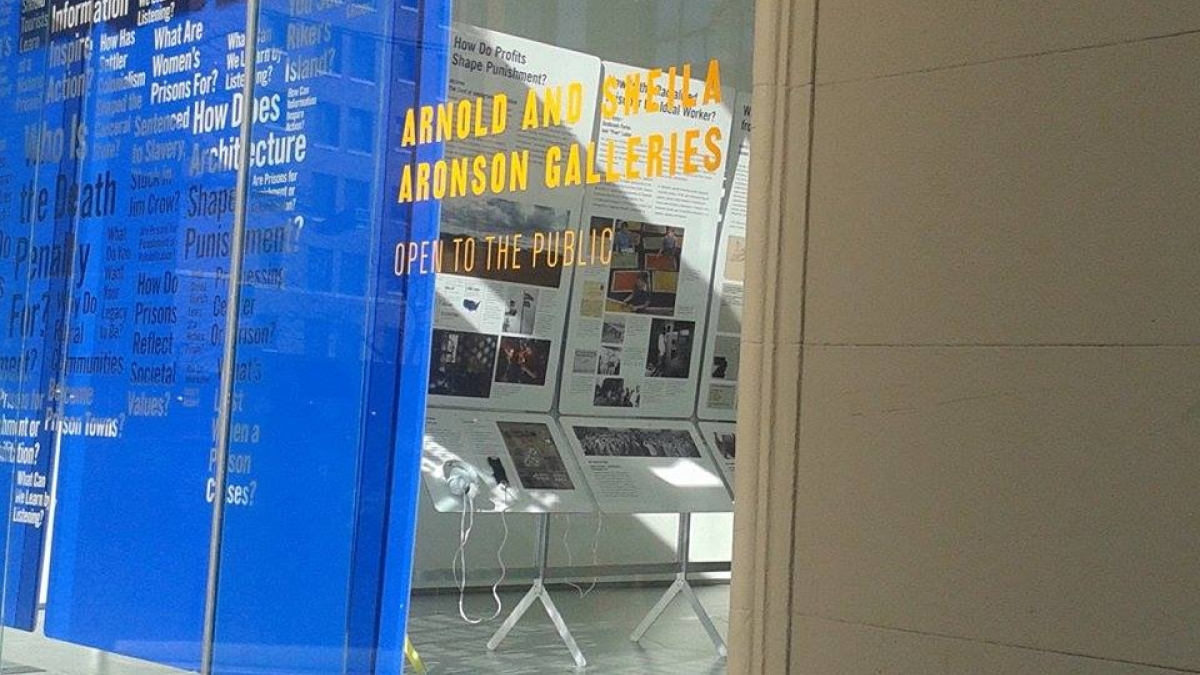Humanities Action Lab receives grant to produce projects on social issues

The Humanities Action Lab's "States of Incarceration: A National Dialogue of Local Histories" launched in New York City at The New School’s Sheila Johnson Galleries in April 2016.
The National Endowment for the Humanities has announced a $310,000 grant to the Humanities Action Lab (HAL), a coalition of 20 universities, including Arizona State University, collaborating to produce student- and community-curated public projects on pressing social issues.
The funds will support public dialogues and local exhibits around HAL’s current project, "States of Incarceration: A National Dialogue of Local Histories," a traveling exhibit, web platform, and curricula focusing on mass incarceration, in Phoenix and 19 other communities. Today, the United States incarcerates more of its citizens than any other country in the world and at any other moment in its history. As a result, a massive number and wide range of people are involved in its prison system: from incarcerated people and their families to residents of prison towns to corrections personnel to consumers of prison-made goods and services.
In fall 2015, over 600 students from ASU and 19 other campuses in 17 states collaborated with constituents of nearly 30 community organizations of people directly impacted by incarceration to create the "States of Incarceration"e digital platform and national traveling exhibition exploring the evolution and impact of the United States correctional system. The exhibition launched in New York City at The New School’s Sheila Johnson Galleries in April 2016, and has since made its way to cities across the country, from Austin, Texas, to Riverside, California, to Greensboro, North Carolina and on.
In September 2018, the exhibition will open in Phoenix at Burton Barr Central Library. In conjunction with the exhibit, some of the funds will also be used to host a Mass Story Lab project in Phoenix through which individuals impacted by mass incarceration will be trained in storytelling techniques and then lead a community conversation on immigrant detention and incarceration.
"By highlighting the human cost of immigrant detention at Eloy Detention Center, ASU's portion of the exhibit draws attention to the growing impact of the private prison industry on matters of immigration enforcement in the United States," said Leah Sarat, associate professor of religious studies in ASU’s School of Historical, Philosophical and Religious Studies.
“With this grant from the National Endowment for the Humanities, one of the nation’s largest funders of humanities programs, we will continue to provide opportunities to collectively reframe current debates and open new forms of dialogue about the future of the US criminal justice system,” said Liz Sevcenko, director of the Humanities Action Lab. “We hope that through the process of exploring the histories, memories, and experiences of incarceration locally, students and partners directly affected by incarceration will engage diverse publics in the most pressing criminal justice issues from their own communities, and also inform the national conversation.”
“NEH grants matter in the many communities we serve around the country--in preserving cultural heritage, supporting local cultural organizations, and helping teachers teach and students learn,” said Chairman William D. Adams. “Our grants also matter at the national level, where they preserve our history and acquaint people more deeply with our cultural and political traditions. In making the humanities accessible to all Americans, NEH serves the common good."
In addition to ASU, funds from this NEH grant will support programming in Boston, MA (led by Northeastern University at its International Village), Saratoga Springs, NY (led by Skidmore College and its Tang Museum), Newark, NJ (partnership between Rutgers-University Newark and the Gateway Gallery), New Brunswick, NJ (Rutgers University-New Brunswick at its Douglass Library), Nashville, TN (Vanderbilt University) and Minneapolis-St.Paul, MN (University of Minnesota). Other universities partnering in "States of Incarceration" are Brown University, DePaul University, Duke University, Indiana University-Purdue University Indianapolis, Parsons Paris, University of California, Riverside, University of Connecticut, University of Massachusetts Amherst, University of Miami, University of New Orleans, University of North Carolina at Greensboro, and University of Texas at Austin.
More Arts, humanities and education

ASU professor's project helps students learn complex topics
One of Arizona State University’s top professors is using her signature research project to improve how college students learn…

Award-winning playwright shares her scriptwriting process with ASU students
Actions speak louder than words. That’s why award-winning playwright Y York is workshopping her latest play, "Becoming…

Exceeding great expectations in downtown Mesa
Anyone visiting downtown Mesa over the past couple of years has a lot to rave about: The bevy of restaurants, unique local shops…

